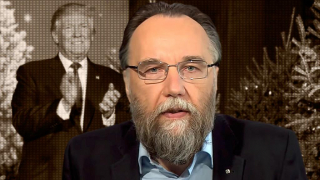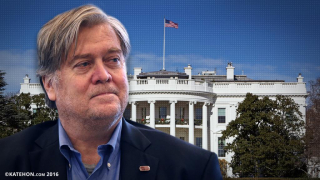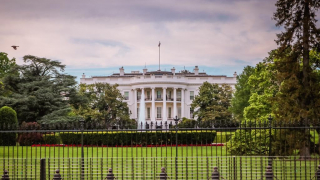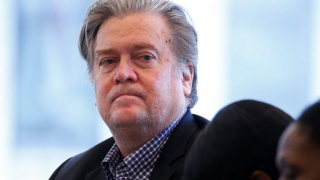Bannon and Traditionalism
The moment we knew Donald Trump would lose the 2016 presidential election was on August 17. That was the day he tapped Steve Bannon — head of Breitbart News and the chief enabler of the alt-right — to run his foundering campaign. Bannon’s appointment defied an iron law of US politics that says you must tack to the centre for the general election, having played to the base during the primaries. Trump reversed that logic by entrusting the final stretch to the biggest incendiary in the game. He was sure to go down in flames.
Not for the first time in 2016, it was conventional wisdom that went up in smoke. Did Trump win in spite of Bannon, or because of him? Joshua Green, a journalist at Bloomberg Businessweek who has observed both close up for many years, is sure of the answer: “Trump wouldn’t be president if it weren’t for Bannon,” Green writes. “Together, their power and reach gave them strength and influence far beyond what either could have achieved on his own.” Green calls it a “devil’s bargain”. A feature of his instructive book is that by the end we are still not sure which of the two is the devil.
Green is in little doubt that Trump took his “America First” philosophy from Bannon. After Mitt Romney’s defeat in 2012, Trump attacked the Republican nominee for having been too harsh on immigrants. Two years later, having immersed himself in a diet of Breitbart News, Trump was singing a different tune. An analysis of Trump’s tweets show that Breitbart was by far his favourite source. In contrast to Trump, Bannon has never wavered in his convictions. To the extent Trump possesses a philosophy, he took it from Bannon as a “fully formed, internally coherent world view”, writes Green.
One of the virtues of Green’s book is that he allows Bannon to tell much of the story himself through extensive interviews. Raised in a blue-collar household in Richmond, Virginia, Bannon began life as a Democrat. His Irish-American family’s lodestar was John F Kennedy. Bannon’s first career was in the navy. It was in 1979, when Jimmy Carter bungled the Iran hostage rescue, that Bannon underwent his political awakening. As a sailor, he had seen Iran’s arid coastline and thought “it was like the fifth century: totally primeval”. Carter’s perceived weakness was Bannon’s road-to-Damascus conversion. From then on he was a man possessed.
Bannon embarked on an almost clichéd path to success. He left the navy to join Harvard Business School. From there he joined Goldman Sachs’ mergers and acquisitions department. Yet it was only in the early 1990s, after he had set up his own boutique investment bank in Los Angeles, that Bannon hit the financial jackpot. As part of a deal to sell Castle Rock Entertainment, Bannon agreed to take a stake in one of its television spin-offs. This included the rights to the then obscure sitcom Seinfeld. The following year, Seinfeld turned into a cult show. The royalties gave Bannon the means to indulge his real passion — defending western civilisation from those seeking to destroy it.
By then he had almost two decades of manic reading under his belt. As a sailor he had embarked on a “systematic study of the world’s religions”. With the restlessness of an autodidact, Bannon then devoured a compendium of obscure, mostly European, thinkers. This included the French writer René Guénon, whose book The Crisis of the Modern World (1927) Bannon still cites. Guénon believed the west’s spiritual decline began in 1312 with the destruction of the Knights Templar. Bannon was also heavily influenced by Julius Evola, an Italian writer, whose Revolt Against the Modern World (1934) influenced Benito Mussolini. He is not alone. Evola’s book has been translated into Russian by Alexander Dugin, Vladimir Putin’s chief ideologist.
The common thread to Bannon’s canon is an apocalyptic foreboding about the fate of the west. What he took from Hinduism was the idea that we are living in the age of Kali Yuga — a 6,000-year period of darkness in which tradition is forgotten. What he took from the Europeans was unshakeable cultural pessimism. Those seeking Bannon’s fingerprints might read Trump’s inaugural “American carnage” address in January, or his “clash of civilisations” speech in Warsaw this month. Whenever Trump sounds dark, you can be sure of Bannon’s hand.
Having made his fortune, Bannon produced a series of alarmist documentaries with names like In the Face of Evil, Fire from the Heartland, and Generation Zero. His one purely commercial foray was to try to profit from World of Warcraft — the “massively, multi player online role-playing game [MMO]”. His venture was a failure. But Bannon’s exposure to the millions of young men who give up days at a time to this fantastical online world was a revelation. The game’s message boards — Wowhead, Allakhazam, Thottbot — had 1.5bn hits a month. Its electoral power was there to be mined. From that sprung Bannon’s interest in Reddit, 4chan and other frequently dystopian chat rooms. Breitbart was partly its fruit.
But were Bannon’s insights the elixir for Trump’s victory? It is hard for Green to prove his case beyond doubt. But he reminds us that the last three weeks of Trump’s campaign were undiluted Bannon. It followed the leak of the notorious Access Hollywood tape where Trump talked of grabbing women “by the pussy”. After that, Trump went full Kali Yuga. He talked of dark plots against America and global banking conspiracies. It hardly matters whether these borderline anti-Semitic rants tipped Trump over the finishing line. The point is that they did not kill his campaign — as they should have. For that, and much else, history will credit Bannon.
Financial Times: Original title "The ‘devil’s bargain’ between Bannon and Trump"










